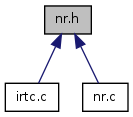
Go to the source code of this file.
Defines | |
| #define | FMAX(a, b) (maxarg1=(a),maxarg2=(b),(maxarg1) > (maxarg2) ? (maxarg1) : (maxarg2)) |
| #define | FREE_ARG char* |
| #define | IMIN(a, b) (iminarg1=(a),iminarg2=(b),(iminarg1) < (iminarg2) ? (iminarg1) : (iminarg2)) |
| #define | NR_END 1 |
| #define | SIGN(a, b) ((b) >= 0.0 ? fabs(a) : -fabs(a)) |
| #define | SQR(a) ((sqrarg=(a)) == 0.0 ? 0.0 : sqrarg*sqrarg) |
| #define | SWAP(g, h) {y=(g);(g)=(h);(h)=y;} |
| #define | TINY 1.0e-20 |
Functions | |
| static | copymat (dest, src, size) pointer dest |
| void | free_nr_matrix (eusfloat_t **m, int nrl, int nrh, int ncl, int nch) |
| void | free_nr_vector (eusfloat_t *v, int nl, int nh) |
| void | lubksb (eusfloat_t **a, int n, int *indx, eusfloat_t b[]) |
| int | ludcmp (eusfloat_t **a, int n, int *indx, eusfloat_t *d) |
| eusfloat_t ** | nr_matrix (int nrl, int nrh, int ncl, int nch) |
| eusfloat_t * | nr_vector (int nl, int nh) |
| void | nrerror (char error_text[]) |
| eusfloat_t | pythag (eusfloat_t a, eusfloat_t b) |
| void | svbksb (eusfloat_t **u, eusfloat_t *w, eusfloat_t **v, int m, int n, eusfloat_t *b, eusfloat_t *x) |
| int | svdcmp (eusfloat_t **a, int m, int n, eusfloat_t *w, eusfloat_t **v) |
| int | svdsolve (eusfloat_t **a, int m, int n, eusfloat_t *b, eusfloat_t *x) |
Variables | |
| static int | iminarg1 |
| static int | iminarg2 |
| static eusfloat_t | maxarg1 |
| static eusfloat_t | maxarg2 |
| register int | size |
| static eusfloat_t | sqrarg |
| static | src |
Define Documentation
Function Documentation
| void free_nr_matrix | ( | eusfloat_t ** | m, |
| int | nrl, | ||
| int | nrh, | ||
| int | ncl, | ||
| int | nch | ||
| ) |
| void free_nr_vector | ( | eusfloat_t * | v, |
| int | nl, | ||
| int | nh | ||
| ) |
| void lubksb | ( | eusfloat_t ** | a, |
| int | n, | ||
| int * | indx, | ||
| eusfloat_t | b[] | ||
| ) |
| int ludcmp | ( | eusfloat_t ** | a, |
| int | n, | ||
| int * | indx, | ||
| eusfloat_t * | d | ||
| ) |
| eusfloat_t** nr_matrix | ( | int | nrl, |
| int | nrh, | ||
| int | ncl, | ||
| int | nch | ||
| ) |
| eusfloat_t* nr_vector | ( | int | nl, |
| int | nh | ||
| ) |
| eusfloat_t pythag | ( | eusfloat_t | a, |
| eusfloat_t | b | ||
| ) |
| void svbksb | ( | eusfloat_t ** | u, |
| eusfloat_t * | w, | ||
| eusfloat_t ** | v, | ||
| int | m, | ||
| int | n, | ||
| eusfloat_t * | b, | ||
| eusfloat_t * | x | ||
| ) |
| int svdcmp | ( | eusfloat_t ** | a, |
| int | m, | ||
| int | n, | ||
| eusfloat_t * | w, | ||
| eusfloat_t ** | v | ||
| ) |
| int svdsolve | ( | eusfloat_t ** | a, |
| int | m, | ||
| int | n, | ||
| eusfloat_t * | b, | ||
| eusfloat_t * | x | ||
| ) |
Variable Documentation
eusfloat_t maxarg1 [static] |
eusfloat_t maxarg2 [static] |
eusfloat_t sqrarg [static] |
$Id$
Copyright (c) 1987- JSK, The University of Tokyo. All Rights Reserved.
This software is a collection of EusLisp code for robot applications, which has been developed by the JSK Laboratory for the IRT project. For more information on EusLisp and its application to the robotics, please refer to the following papers.
Toshihiro Matsui Multithread object-oriented language euslisp for parallel and asynchronous programming in robotics Workshop on Concurrent Object-based Systems, IEEE 6th Symposium on Parallel and Distributed Processing, 1994
Permission to use this software for educational, research and non-profit purposes, without fee, and without a written agreement is hereby granted to all researchers working on the IRT project at the University of Tokyo, provided that the above copyright notice remains intact.